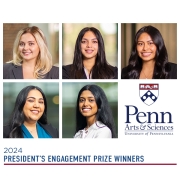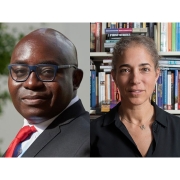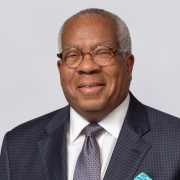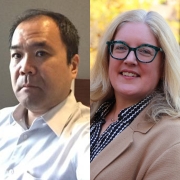David Christianson Selected as 2015-16 Radcliffe Institute Fellow
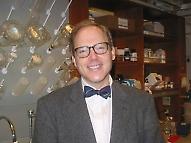
The Radcliffe Institute for Advanced Study at Harvard University has selected David W. Christianson as the Elizabeth S. and Richard M. Cashin Fellow for the 2015–2016 academic year. Christianson, the Roy and Diana Vagelos Professor of Chemistry and Chemical Biology in Penn Arts and Sciences, joins more than 50 scholars, scientists, and artists who will each pursue an ambitious individual project within the Institute’s multidisciplinary community. He is among only 3 percent of applicants accepted to the program.
Christianson’s research focuses partly on the structure and function of metal-requiring enzymes. His work demonstrated that the manganese-containing enzyme arginase is a drug target for sexual arousal disorders. Additional research suggests that the enzyme could be important in treating other medical conditions, including cardiovascular disease and asthma. In 2008, Christianson, Penn, and fellow researchers at Johns Hopkins University founded Arginetix, now Corridor Pharmaceuticals, Inc., to commercialize arginase inhibitors developed in Christianson's laboratory.
His research has also illuminated complex molecular mechanisms in the biosynthesis of terpenes. These enzymes catalyze the first steps in the biosynthesis of more than 70,000 natural products, including cholesterol, the cancer chemotherapy drug Taxol, and simpler terpenoids used in jet fuel and biodiesel.
At the Radcliffe Institute, Christianson will work to develop "blueprints" to understand and guide the protein engineering of terpenoid cyclases. Engineered terpenoid cyclases can be used in synthetic biology approaches for the large-scale generation of health- and energy-relevant terpenoids. As a Visiting Professor of Chemistry and Chemical Biology at Harvard in the spring semester, he will also develop and teach a course on organic chemistry of life processes, which he will bring to Penn when he returns.
Christianson received the Repligen Award for Chemistry of Biological Processes in 2013, and was named a Fellow of the Guggenheim Memorial Foundation in 2006. He has also been a Searle Scholar, an Office of Naval Research Young Investigator, an Alfred P. Sloan Foundation Research Fellow and a Senior Fellow of the American Asthma Foundation. He received the 1999 Pfizer Award in Enzyme Chemistry from the ACS, and the 2006 Underwood Fellowship from the Biotechnology and Biological Sciences Research Council of the United Kingdom.
The Radcliffe Institute for Advanced Study at Harvard University is dedicated to creating and sharing transformative ideas across the arts, humanities, sciences, and social sciences.
